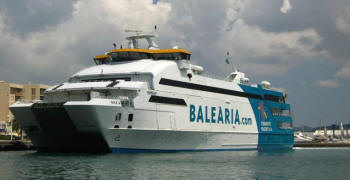|
||||||||||||
|
||||||||||||
|
|
|
|||||||||||
|
Back to News Menu Cruise News for the Corporate Travel Professional December 2015 |
||||||||||||
| Florida-Cuba Ferry Service Unlikely Before Late 2016 | ||||||||||||
|
If you've been itching to take a ferry from Florida to Cuba, be patient. It probably won't start before the second half of 2016 and could take longer, according to ferry executives. Spain's ferry veteran Balearia said Thursday that it has proposed to invest more than $35 million to build a ferry terminal and related facilities in Havana to help speed the start of Florida-Cuba service. But Havana has not approved that project or any U.S-Cuba ferry venture yet, executives said. Cuba needs to develop terminal facilities for proposed ferries from Florida, complete with customs and immigration processing and room to handle passengers and freight. That requires millions of dollars in investment. Still, Havana need not accept Balearia's offer to build a large, permanent terminal and could opt for less expensive, temporary facilities first to assess what's needed longer term, U.S. executives said. Excitement over Florida-Cuba ferries had surfaced this spring, when the U.S. government issued the first approvals for Florida ferry service to Cuba in more than half a century. At least seven companies were granted U.S. licenses, and some executives hoped to start the routes as soon as this fall. But much has changed since then. After the U.S. and Cuba restored diplomatic relations this summer, Washington liberalized rules for sea transport to Cuba and no longer requires specific licenses for ferries to the island. That means any ferry company that receives Cuban approval now can start up Florida-Cuba service, said veteran cruise operator Bruce Nierenberg, CEO of United Caribbean Lines, one of the companies that received a U.S. license this spring. What's more, Cuba has decided to wait on authorizing ferry service from Florida. "The Cuban government has said they'll hold off for several months. It's not a priority now," Nierenberg said. With U.S. air travel to Cuba booming, Havana has said it wants to focus on building more hotel rooms and on developing facilities for cruises, whose passengers won't need hotels, he said. "It won't start before the second half of 2016 at the earliest," Nierenberg said. "Cuba is taking its time. They're thinking it through. You have to have a lot of patience." Florida-Cuba ferries would be especially attractive for Cuban-Americans who often bring supplies to family and friends on the island, from food to appliances to equipment for private businesses. Those visitors now pay hefty fees to carry extra baggage by plane and would pay less to take cargo by ferry. But Cuba has yet to change its rules to allow Cuban-Americans to arrive by sea, said Vivian Mannerud, president of Airline Brokers Co. of Miami, which also holds one of the U.S. ferry licenses. U.S. ferries to Cuba don't make financial sense without Cuban-Americans and cargo, she said. Spain's ferry veteran Balearia, which operates ferries from Fort Lauderdale to the Bahamas, said it has made a proposal to Cuba to spend nearly 35 million euros, or some $38 million at today's exchange rate, "to show the willingness of the company to invest in Cuba and operate from Havana," said spokeswoman Pilar Boix. Balearia also offered to operate four solar-powered boats that can hold about 100 passengers each to serve as shuttles around the Havana Bay area, a news release said. Those boats could link with other transport hubs in the city, providing links to buses, taxis and trains. Seaports in Fort Lauderdale, Palm Beach County, Miami, Tampa, Key West and elsewhere are vying to host Cuba ferry service and boost their business. Nierenberg said his United Caribbean Lines aims to operate two overnight cruise-ferries to Cuba from Miami and Tampa. The ships would depart Florida in the afternoon and reach Havana in the morning. His line plans to use vessels with some 500 cabins that are "like a cruise ship on a top of a garage" that can hold about 500 cars and some 1,500 trailers, he said. A passenger would pay about $295 roundtrip and could rent a bin for about $150 to take up to 1,000 pounds of freight, Nierenberg said. |
||||||||||||
|
Worldwide Travel & Cruise Assoc., Inc. 150 S. University Dr. Ste E, Plantation, FL 33324 - USA Tel: +1 954 452 8800 Fax: +1 954 252 3945 |
||||||||||||
|
Designed & Published by: Worldwide Media. |
||||||||||||


